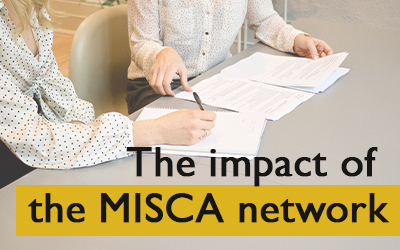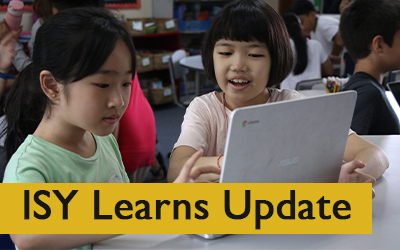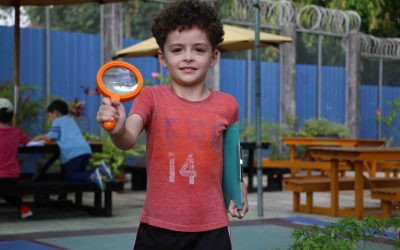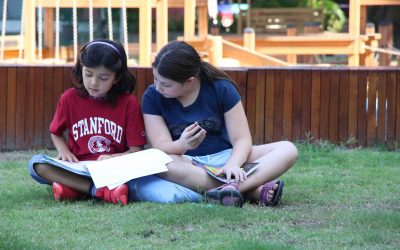ISY LEARNS
Releasing Stress by Reading

Danny McCamlie, ISY Secondary Teacher
We’ve reported on COVID impact on student well-being and our communities, but what about teachers, the backbone of education?
Research from the University of Sussex in 2009 suggests that reading for pleasure may be the ultimate stress relief. So when the WiFi ruins your Zoom or Google Meets dial-in, Nearpod freezes, students just aren’t engaging and your administrator is doing their daily learning walk it may well be the time to reach for a real page turner.

The study found that reading was;
- 30% more effective then taking a walk
- 68% more effective than listening to music
- 100% more effective than a tea or coffee break
As little as 6 minutes was found to slow heart rates, ease muscle tension and alter reported states of mind. Dr David Lewis, a cognitive neuropsychologist and co-author of the study reported that “We gave people options to work off their stress; one was listening to music, one was going for a walk, one was sitting quietly meditating, and the last one was reading. We measured the changes in their body and their brain activity, and we found that of these various ways of relaxing, reading was the most satisfactory, this is because, when reading a good book, your mind is distracted from daily stresses and worries that create tension, causing it to enter an “Alpha” state, which refers to being focused or in a resting zone” he explains.
Don’t rush to pick up any old book just yet however. Dr. Lewis concluded that work-related material or complex and disturbing material can have the opposite effect. “You have to develop ‘flow’, which refers to time passing without you being aware of it,” Lewis explained. “It has to be absorbing and consuming. What a book is doing, at least when it’s compelling, is it’s producing a sense of alternate state in the brain. It’s creating a whole range of images and pictures in your brain, and that’s when you become most relaxed.” At a time when COVID-19 is causing global lockdowns, elections are looming in one of the world’s largest superpowers and the environment is being over-burdened by an increase deluge of PPE waste, the news is unlikely to be the escapism that research shows books facilitate.
Dr Deborah Lee, a consultant clinical psychologist believes that book clubs offer many positive health benefits and says she has seen evidence that these can work even during this period of lockdown. “Book clubs have proved increasingly popular, even in lockdown, and many have continued online with Zoom and Microsoft Teams,” she says. “For example, an audiobook club for a small group of cancer patients showed positive experiences from attentive listening and involvement with the group.”
On the other hand, Lewis warns that attending a book club – be it physically or virtually – may cause your stress levels to spike, particularly if you’re gathering with opinionated and argumentative people. “If you’re taking part in a book club and you’re making criticism or critical comments, it’s likely to generate more high-level frequencies in the brain. People generally become more alert,” he says.
Right now, it’s more important than ever to find some time to relax, and the evidence shows that diving into a page-turning novel – even if it’s just for a few minutes each day – could just be the best way to do it. When it comes to reading for pleasure, then, it seems that teachers may have been right all along.
Reference:
Galaxy Stress Research, Mindlab International, Sussex University (2009)
Previous ISY Learns Posts
The Impact of the MISCA Network
ISY’s High School Counselor Mick Amundson-Geisel provides insight on how the MISCA Network has impacted not only his practice but the lives our our ISY students.
ISY Learns Updates – December Edition
This December Edition of ISY Learns Update provides a brief update of Quarter 3 planning as well as interesting/helpful updates for ISY teachers.
Engaging Students to Ask Better Questions
“The important thing is not to stop questioning. Curiosity has its own reason for existing.” – Albert Einstein. This post talks about how to get students to ask better questions and why that’s important.
Activating Curiosity
This next blog post features the first leg of our tools that support learning – curiosity. We’ll dive into how you can activate students’ curiosity by having them make observations of a provocation.
Tools that Support Learning
Welcome to the inaugural post of the new ISY blog – ISY Learns! In this post the new Director of Curriculum & Learning, Eric Brown, lays out his plans for going through his philosophy of learning.





